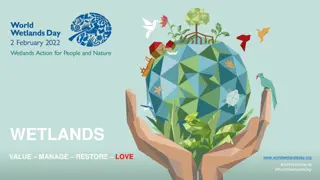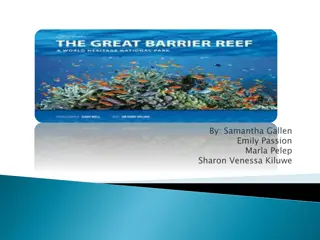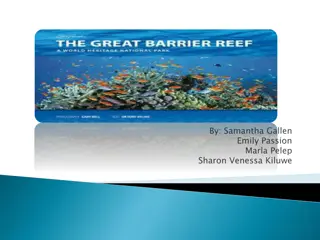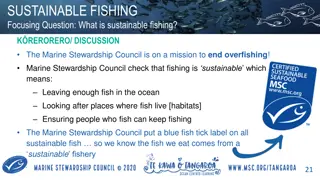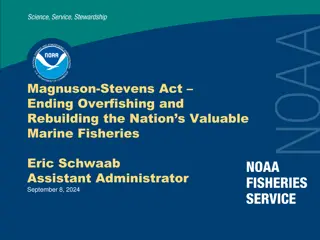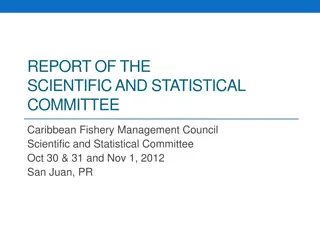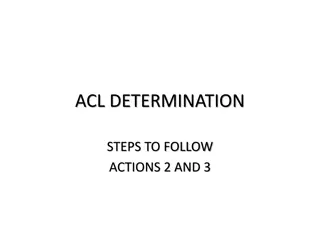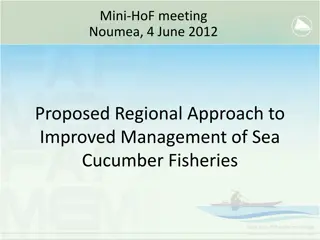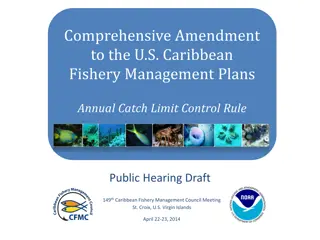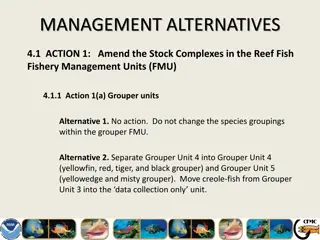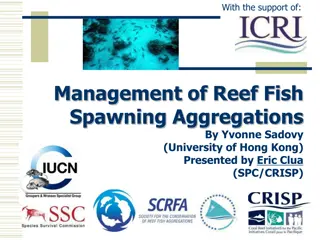World Wetlands Day 2022: Taking Action for Wetlands Conservation
World Wetlands Day is an annual event celebrated on February 2nd to raise awareness about the importance of wetlands for people and the planet. This year's theme, "Wetlands Action for People and Nature," emphasizes the urgent need for increased investment in the conservation of wetlands to ensure th
0 views • 12 slides
Discovering the Wonders of the Great Barrier Reef
The Great Barrier Reef, located off the coast of Queensland, Australia, is the world's largest coral reef system, spanning over 2,900 individual reefs and 900 islands. Protected by the Great Reef Marine Park, it is a vital part of Aboriginal Australian and Torres Strait Islander cultures. The reef s
0 views • 8 slides
Discover the Splendor of the Great Barrier Reef
The Great Barrier Reef, located off the coast of Queensland, Australia, is the world's largest coral reef system, comprising over 2,900 individual reefs and 900 islands. This natural wonder supports a diverse ecosystem and is a popular destination for tourists seeking unique marine experiences. Howe
0 views • 8 slides
Understanding Sustainable Fishing Practices and Conservation Efforts
Sustainable fishing practices are crucial for maintaining healthy marine ecosystems. The Marine Stewardship Council ensures fishing is sustainable by leaving enough fish in the ocean, protecting fish habitats, and supporting fishing communities. Unsustainable fishing practices such as bycatch, shark
2 views • 8 slides
Magnuson-Stevens Act: Ending Overfishing and Rebuilding Marine Fisheries
The Magnuson-Stevens Act aims to end overfishing and rebuild valuable marine fisheries in the US through sustainable practices such as catch shares and strong science. The act has a history of evolution, with the 2006 amendment mandating annual catch limits and market-based management. Councils play
0 views • 21 slides
Caribbean Fishery Management Council Scientific and Statistical Committee Report 2012
The Scientific and Statistical Committee (SSC) of the Caribbean Fishery Management Council reviewed species units with Annual Catch Limits (ACL) overages and discussed research priorities. When ACLs are exceeded, accountability measures are triggered, leading to a reduction in the fishing season. Th
1 views • 26 slides
Understanding ACL Determination Steps for Fisheries Management
Learn about the key parameters involved in maintaining sustainable fishing practices, such as Maximum Sustainable Yield (MSY), Optimum Yield (OY), Overfishing Limit (OFL), Allowable Biological Catch (ABC), and Annual Catch Limit (ACL). Discover how these values are determined and the actions require
0 views • 15 slides
Regional Approach to Sea Cucumber Fisheries Management Proposal in PICTs
Sea cucumbers (Beche-de-mer) play a vital economic role in Pacific Island Countries and Territories (PICTs), with exports valued at over USD 50 million annually. However, the fisheries are at risk due to overfishing. Proposals at recent meetings aim to develop sustainable management frameworks, enha
0 views • 14 slides
Revised U.S. Caribbean Fishery Management Plans
Amendment proposed at the 149th Caribbean Fishery Management Council Meeting aims to establish a control rule adjusting catch limits based on overfishing status changes. The amendment seeks to ensure sustainable fisheries by providing flexibility to adapt to FMU status changes. Buffer reductions app
0 views • 27 slides
Reef Fish Fishery Management Alternatives Overview
Amend the stock complexes in the reef fish fishery management units by considering different actions for the grouper and snapper units. The proposed alternatives aim to redefine management reference points for various species groups within the snapper, grouper, and parrotfish complexes. These adjust
0 views • 38 slides
Importance of Managing Reef Fish Spawning Aggregations
Reef fisheries play a significant role in global fishery landings, supporting millions of people. However, the exploitation of valuable species that aggregate to spawn can lead to overfishing due to inadequate management, conservation, and monitoring. The decline of aggregating fishes in regions lik
0 views • 32 slides
Exploring Tram Chim National Park in Vietnam
This article delves into the biodiversity and conservation efforts at Tram Chim National Park in Vietnam. The park is home to diverse wetlands, various species of vegetation, water birds, and fish. However, it faces threats like overfishing, pollution, and climate change. Local initiatives such as e
0 views • 10 slides
